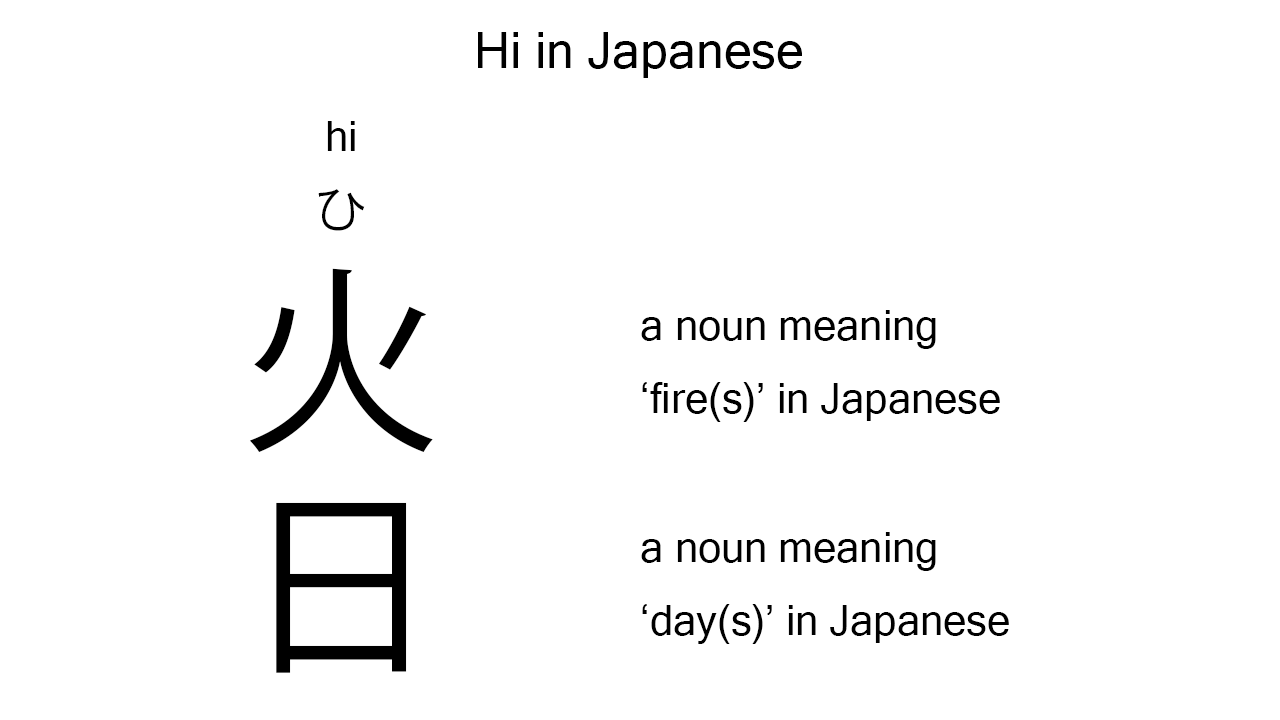What does “hi” mean in Japanese?
There are some homophones, but native speakers say “hi” normally to mean ‘fire’ or ‘day’ in Japanese. Perhaps, some Japanese learners know this word as it is sometimes used in Japanese conversations. In this blog post, however, I will explain this word in detail together with its different kanji characters. And also, I will explain how to use it through example sentences. My explanations would help Japanese learners understand “hi” more clearly. Then, let’s get started!
Contents
Definition and meanings of “hi”
Let me start with the definition and meanings of “hi”.
- hi – 火/日 (ひ) : a noun meaning ‘fire’ or ‘day’ in Japanese. This can also work as plural. Learn more about Japanese plural.
This has two different kanji expressions. The first one refers to a fire; the second refers to a day.

The definition and meanings are simple and clear, I think. Then, let me explain how to use “hi” through the example sentence below.
Example #1: how to say “fire” in Japanese
watashi wa kon’ya aoi hi wo mi ta – 私は今夜青い火を見た (わたしはこんやあおいひをみた)
I saw a blue fire tonight.
Below are the new words used in the example sentence.
- watashi – 私 (わたし) : a pronoun meaning ‘I’ in Japanese.
- wa – は : a binding particle working as a case marker or topic marker. In the example, this works after “watashi” to make the subject in the sentence.
- kon’ya – 今夜 (こんや) : a noun meaning ‘tonight’ in Japanese. This can also work as an adverb almost anywhere in a sentence. In the example, this works as an adverb in the middle of the sentence to say “tonight” in Japanese.
- aoi – 青い (あおい) : an i-adjective meaning ‘blue’ in Japanese.
- wo – を : a case particle used to make the object word in a sentence. In the example, this works after “aoi hi” to make the object in the sentence.
- mi – 見 (み) : one conjugation of the verb, “miru“, which means ‘to see’ or such in Japanese. In the example, it has been conjugated for the better connection with its following word.
- ta – た : an auxiliary verb used after a verb, adjective, or auxiliary verb to make its past tense form. Probably, this is well known as a part of Japanese ta form. In the example, this is used after “mi” to make its past tense form, “mi ta”.
This is a typical usage of “hi”. In this example, it works together with the i-adjective, “aoi”, to mean a ‘blue fire’ in Japanese. When we want to say “fire” in Japanese, anyway, this noun is a very good option.
Example #2: another usage of “hi”
kyou wa atatakai hi deshi ta – 今日は暖かい日でした (きょうはあたたかいひでした)
It was a warm day today.
Below are the new words used in the example sentence.
- kyou – 今日 (きょう) : a noun meaning ‘today’ in Japanese. This can also work as an adverb almost anywhere in a sentence. In the example, this works as a noun.
- atatakai – 暖かい (あたたかい) : an i-adjective meaning ‘warm’ in Japanese.
- deshi – でし : one conjugation of the auxiliary verb, “desu”, which is used after a noun or adjective to make it sound polite. In the example, it has been conjugated for the better connection with its following word.
This is another typical usage of “hi”. In this example, it works together with the i-adjective, “atatakai”, to say a “warm day” in Japanese. The original meaning of the Japanese sentence is more like “today was a warm day”, but it has been translated more naturally.
Summary
In this blog post, I’ve explained the definition and meanings of “hi” together with its different kanji characters. And also, I’ve explained how to use it through the example sentences. Let me summarize them as follows.
- hi – 火/日 (ひ) : a noun meaning ‘fire’ or ‘day’ in Japanese. This can also work as plural. This has two different kanji expressions. The first one refers to a fire; the second refers to a day.
Hope my explanations are understandable and helpful for Japanese learners.